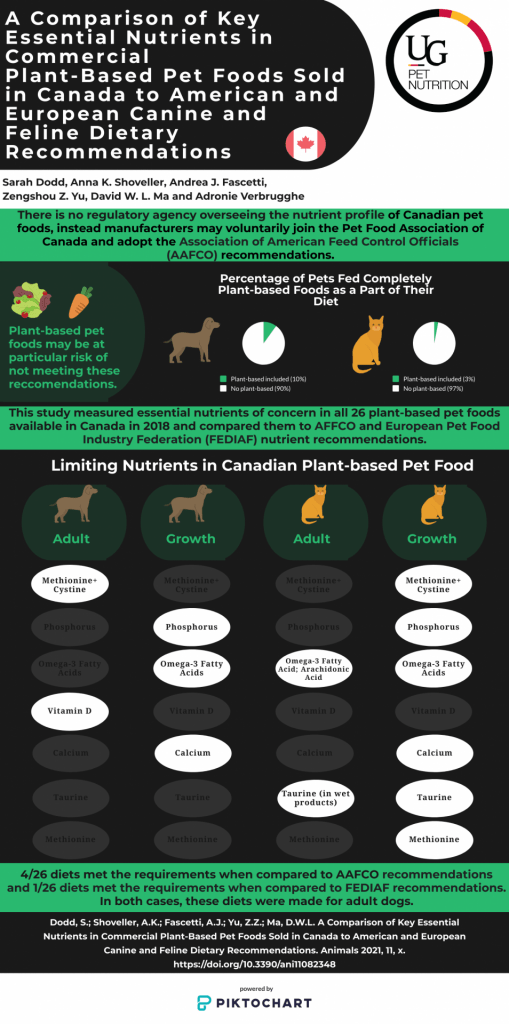Congratulations to Sarah Dodd on her most recent publication, A Comparison of Key Essential Nutrients in Commercial Plant-Based Pet Foods Sold in Canada to American and European Canine and Feline Dietary Recommendations, published earlier this month in the journal, Animals.

Plant-based diets occupy a small, but likely growing, niche in the pet food market. Although dogs and cats are facultative and obligate carnivores, respectively, in theory it is possible to provide for all of their known nutritional requirements without including animal products in their diet. In practice, however, there are challenges to overcome in formulating and producing such a diet while continuing to provide the necessary complete and balanced nutrition.
Previous work has suggested that, while total protein content is typically not an issue, the provision and balance of amino acids in plant-based diets may be compromised. Similarly, although total fat requirements can easily be met with vegetable oils, some fatty acids can be challenging to provide, such as arachidonic acid for cats. Additionally, growing cats and dogs have stricter requirements than those of adults, with a number of nutrients considered essential for growth that are not considered essential for maintenance, such as the omega-3 fatty acid DHA.

In this study, a sample of each widely available commercial plant-based diet sold in Ontario, at the time the study was performed (2018), underwent laboratory analyses to measure the content of each nutrient of concern. What was found was that: while some adult dog foods contained all the essential nutrients in appropriate quantities and proportions as per the American Association of Feed Control Officials recommendations, the majority of diets did not meet the minimum recommended content for some essential nutrients in adult dogs. None of the analyzed plant-based pet foods met the requirements for puppies, kittens, or adult cats. The most problematic nutrients were those that are typically found in high concentrations in animal tissues but are only found in lower concentrations in plant materials. These included the sulfur amino acids (methionine and cysteine), taurine, omega-3 fatty acids, calcium, phosphorus, and vitamin D.
Although the nutrients of most concern were typically those which are found in lower concentrations in plant ingredients, based on the finding that some diets were able to meet all nutrient recommendations for adult dogs without including animal-derived products, this study demonstrates that production of complete and balanced plant-based diets is achievable for some pets. More work must be done in this field to improve the quality of commercially available plant-based diets to ensure they are meeting the needs of the animals to which they are fed.
The presented research project was supported by a grant from the OVC Pet Trust.
The OVC Pet Nutrition Team continues to investigate the suitability of plant-based diets for cats and dogs – stay tuned for more information!
Written by: Dr. Sarah Dodd, BVSc, MSc, PhD Candidate, ECVCN Resident
Edited by: Shoshana Verton-Shaw, RVT, VTS (Nutrition)
Dr. Adronie Verbrugghe, DVM, PhD, EBVS Specialist in Veterinary and Comparative Nutrition® (Dip ECVCN)
Infographic by: Cristian Mastrangelo, OVC Pet Nutrition Summer Student


